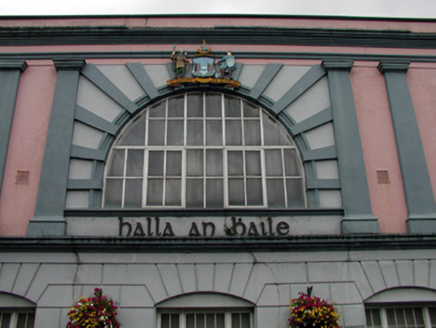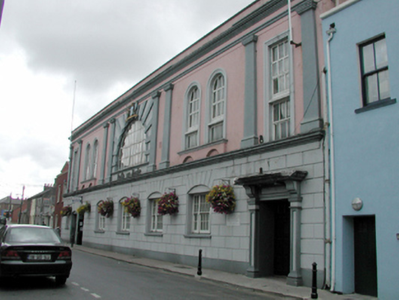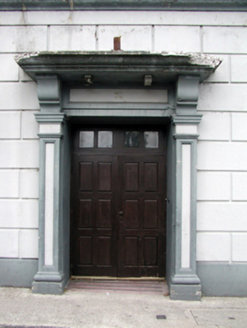Survey Data
Reg No
22821122
Rating
Regional
Categories of Special Interest
Architectural, Artistic, Historical, Social
Previous Name
Dungarvan Town Hall and Butter Market
Original Use
Town/county hall
In Use As
Museum/gallery
Date
1860 - 1865
Coordinates
226134, 92988
Date Recorded
02/09/2003
Date Updated
--/--/--
Description
Terraced seven-bay two-storey Classical-style town hall, built 1861, possibly incorporating fabric of earlier warehouse, c.1810, on site. Extensively renovated, 1987, to accommodate use as museum. Hipped gabled roof behind parapet with replacement artificial slate, 1987, clay ridge tiles, and cast-iron rainwater goods. Painted rendered walls with rendered dressings including rustication to ground floor having moulded cornice over, paired pilasters to first floor supporting frieze with moulded cornice over having blocking course to parapet with rendered coping. Square-headed window openings to ground floor in tripartite arrangement in shallow segmental-headed recesses with rendered sills. Replacement 8/8 timber sash windows, 1987, with 4/4 sidelights. Square-headed window openings to first floor outer bays with rendered sills, and moulded rendered surrounds. Paired round-headed window openings to first floor on rendered aprons with moulded rendered sills, and rendered surrounds. Round-headed Diocletian-style window opening to centre first floor with moulded rendered sill surmounting raised lettering, moulded rendered surround having splayed voussoirs, and Coat-of-Arms. Replacement timber casement windows, 1987, to all window openings to first floor. Square-headed door openings with rendered panelled pilaster surrounds having consoles, frieze over supporting deep moulded cornice, and replacement timber panelled double doors, 1987, having overlights. Road fronted with concrete footpath to front.
Appraisal
An imposing substantial town hall forming a landmark site on Friary Street (Saint Augustine Street). The building is of particular significance in the locality as one of the earliest-surviving civic buildings in Dungarvan. Now serving an alternative use, the building retains most of its original form, and is distinguished by the fine rendered detailing throughout producing a robust Classical-style flavour.





